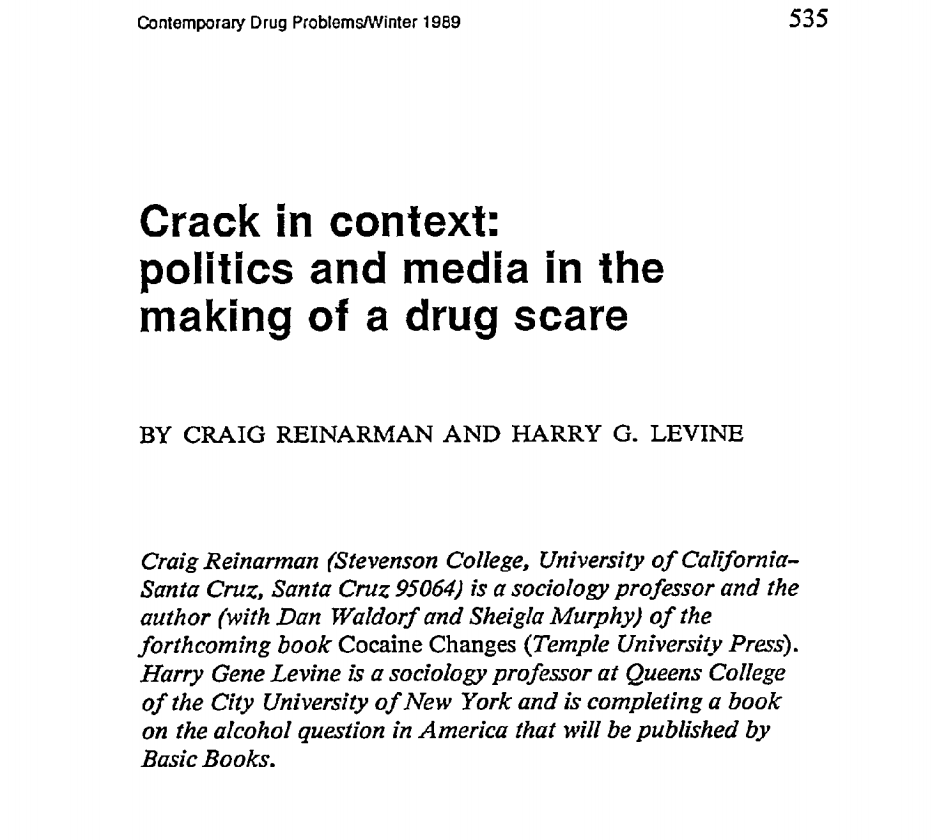So since people want to act like I’m lying about the relationship between the media, mass incarceration, and the crack era, I might as well expose other people who dare to make such an “extreme” argument.
In 1989 Craig Reinarman and Harry G. Levine published a study entitled “Crack in context: politics and media in the making of a drug scare” where they tracked media coverage along side drug use/abuse stats. Below are quotes from their conclusion.
"In the current crack scare, the media& #39;s desire for dramatic
drug stories interacted with politicians& #39; desire for safe election-year issues so that news about crack spread to every nook and cranny of the nation far faster than dealers might have spread word on the street."
drug stories interacted with politicians& #39; desire for safe election-year issues so that news about crack spread to every nook and cranny of the nation far faster than dealers might have spread word on the street."
"Drug scares blame individual immorality and personal
behavior for endemic social and structural problems, and
they divert attention and resources from those larger problems."
behavior for endemic social and structural problems, and
they divert attention and resources from those larger problems."
"Drug scares have long linked drug use with racial
minorities, the poor, or wayward youth and have blamed
economic problems-and often other real and imaginary
problems in society-on their use of drugs."
minorities, the poor, or wayward youth and have blamed
economic problems-and often other real and imaginary
problems in society-on their use of drugs."
"Obscured or forgotten in all the political rhetoric on and media coverage of crack are the social and economic problems that underlie drug abuse, and that are much more widespread-especially poverty, unemployment, and the prospects of life in the permanent underclass."
"Liberal Democrats denounced the Reagan administration& #39;s
hypocrisy in declaring war on drugs and then cutting the
budgets for treatment, prevention, and research...
hypocrisy in declaring war on drugs and then cutting the
budgets for treatment, prevention, and research...
However, they usually missed the more important point: the "just say no" administration had just said no to virtually every social program aimed at creating alternatives for inner-city young people and improving their lawful life chances. "
Thus, there is harm in drug scares, first, for what they do to democratic discourse on and popular understanding of public problems: they falsely attribute to drugs alone a wide array of problems that have little to do with drugs and much to do with U.S economic and social policy
Then there is a study by Jennifer E. Cobina in 2008 entitled "Race and Class Differences in Print Media Portrayals of Crack Cocaine and Methamphetamine"
She found that "media reports on crack cocaine frequently referenced African Americans and depicted the drug in conjunction with violent crime. However, articles on methamphetamine were more likely to reference poor Whites and associate this drug as a public health problem."
Then there is a piece written by William Chambliss wrote in 1995 entitled "Crime Control and Ethnic Minorities: Legitimizing Racial Oppression by Creating Moral Panics" where he talks about the crime bill specifically. Below are some quotes.
"This bill, like a spate of anticrime bills dating back to the late 1960s, is the culmination of the politicization of crime, a process that began when the Republican Party under Barry Goldwater& #39;s campaign in 1964 raised crime in the streets as a major political issue."
"The end result of this process has many dire consequences, including that (1) the United States incarcerates more of its citizens than any other country in the world..
2) federal and state budgets have shifted public expenditures from other, more important, social services to crime control.
and (3) racism and the systematic oppression of minority groups, especially young African American men, has been legitimized and institutionalized in the criminal justice system."
"Politicians, law enforcement officials, and the media made crime a national issue in the 1960s, 70s, and 80s, and thereby legitimized the passage of laws and the allocation of major resources to the problem."
"The official justification for the unprecedented expansion of the crime control industry is, of course, that it will reduce crime. Increased police surveillance, mandatory prison sentences, and more severe penalties have never effectively reduced crime."
Chambliss concluded the following...
"Between 1964 and 1990 a coalition of interests including conservative legislators, the crime control industry, and the media created a moral panic about crime in the United States.
"Between 1964 and 1990 a coalition of interests including conservative legislators, the crime control industry, and the media created a moral panic about crime in the United States.
As a result, public expenditures at every level of government have been transferred from other social programs into crime control.
Police powers have been substantially increased both by increases in numbers of police officers and laws giving the police a virtual carte blanche in dealing with suspects.
The nature of policing in a class society inevitably leads to policing the poor and minorities rather than those in social classes capable of creating problems if they are heavily policed.
As a consequence, we have seen a dramatic increase in the number of arrests, convictions, and prison sentences meted out to the poor and especially the minority poor."

 Read on Twitter
Read on Twitter



